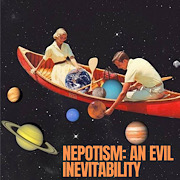|
Have you been by the way? Might be a good place to go during a holiday when the naturey tourist traps are like that scene with the people dump trucks from Soylent Green.
|
|
|
|

|
| # ? May 16, 2024 15:22 |
|
Nope. Wanna go there and Xian first time I have time off.
|
|
|
|
Grand Fromage posted:There are other places this is done too. The Chinese aren't allowing any excavation of Qin Shi Huangdi's mausoleum until they feel it can be properly preserved, for one big example. So they say, but I'm pretty sure that they're just waiting till they can confirm he's actually dead and didn't figure out the secret of immortality after all
|
|
|
|
Grand Fromage posted:Also, there's resistance from many governments about it. Too much pride, can't admit that you aren't financially capable of taking care of your own heritage. This, plus most guys wealthy enough to be deep into philanthropy are smart enough not to give hosed up (corrupt and/or inefficient) governments the level of control over how the money is used that they want. My understanding is that this is something the Bill and Melinda Gates Foundation runs up against constantly; they want to give some money to help do useful thing X but incredibly corrupt or inefficient government Y wants the funds funneled through them. Even if you're crazy-mega rich like the Gates you have limited funds and don't want to apply those sorts of inefficiencies to your giving.
|
|
|
|
"Inefficiencies" i.e. they steal all the money.
|
|
|
|
Tell me stuff about Galen that wiki doesn't adequately touch upon.
|
|
|
|
More Roman archaeology news: http://www.culture24.org.uk/history...n-Hadrians-Wall
|
|
|
|
On the subject of doomed rebellion, does the successful overthrowing of the the Ming Dynasty count? Or were the Manchus the primary cause and deserving of the credit?
|
|
|
|
Femur posted:On the subject of doomed rebellion, does the successful overthrowing of the the Ming Dynasty count? Or were the Manchus the primary cause and deserving of the credit? Wouldn't the Ming overthrowing the Yuan be a more obvious example to go with?
|
|
|
|
Ugh I just watched 300:RoaE and then went and checked and Sparta only sent 16 ships to Salamis but demanded to be in command. Athens sent 180.
|
|
|
|
Arglebargle III posted:Ugh I just watched 300:RoaE and then went and checked and Sparta only sent 16 ships to Salamis but demanded to be in command. Athens sent 180. Halicarnassus only sent six, but was in charge of the whole Persian fleet, right?
|
|
|
|
Arglebargle III posted:Ugh I just watched 300:RoaE and then went and checked and Sparta only sent 16 ships to Salamis but demanded to be in command. Athens sent 180. I usually enjoy that kind of movie, but they definitely ruined what could have been something really cool. I think it would have been better had the Greek fleet started off with several hundred ships, and gotten whittled down to a few dozen. Then a half-dozen Spartan ships show up and save the day. 300 in reverse. The End. On another subject, how well did common people understand Christian doctrine past 300 AD or so? Was it just "Oh, the priestly class is telling us to do X, so we do X", or did individuals have a deeper personal knowledge of their doctrine? Does anyone have any recommendations for books on the early history of the Catholic church (say, to around 600AD)?
|
|
|
|
Ynglaur posted:On another subject, how well did common people understand Christian doctrine past 300 AD or so? Was it just "Oh, the priestly class is telling us to do X, so we do X", or did individuals have a deeper personal knowledge of their doctrine? Does anyone have any recommendations for books on the early history of the Catholic church (say, to around 600AD)? I can't recommend any history book about this subject, but there's some funny bits about this matter in Robert Graves novel "Count Belissarius", one of the characters complains that in his century, everyone discusses about theology all the time, from the lowliest prostitute to the richest merchant and nobody has a clue. Great novel btw.
|
|
|
|
Ynglaur posted:On another subject, how well did common people understand Christian doctrine past 300 AD or so? Was it just "Oh, the priestly class is telling us to do X, so we do X", or did individuals have a deeper personal knowledge of their doctrine? Does anyone have any recommendations for books on the early history of the Catholic church (say, to around 600AD)? This isn't specifically about it, but I remember that the author describes this issue at length when building the background for his study, so the footnotes should give you a good reading list. Gerald Strauss, "Luther's House of Learning: Indoctrination of the Young in the German Reformation." The tl;dr on the issue (at least according to Strauss) is that at one point Luther et al did a quick and dirty survey of the more backwoods areas of Germany and discovered that local understandings of basic Christian doctrine ranged between "super superficial" and "these people are essentially still pagans." Translating the bible to the vernacular is well and good but these people aren't literate in any tongue, hence what can broadly be understood as the beginning of mass education in Germany. Strauss is less concerned with how religiously literate the peasants were before Luther than he is with what happens after, but like I said his footnotes in the background section should be a gold mine for you. It's sadly out of print but any half-decent university library should have a copy. Worst case ILL one from a neighboring institution.
|
|
|
|
Ynglaur posted:On another subject, how well did common people understand Christian doctrine past 300 AD or so? Was it just "Oh, the priestly class is telling us to do X, so we do X", or did individuals have a deeper personal knowledge of their doctrine? Does anyone have any recommendations for books on the early history of the Catholic church (say, to around 600AD)? The vast majority of the population was illiterate. Bibles were fantastically expensive before Gutenberg, so nobody had one. The only way people could know doctrine or anything Biblical was from what priests told them. Cathedrals had stained-glass windows to help in telling and remembering important events from the Bible. The Christian church was hugely fragmented early on. The first half-dozen centuries were all about arguing over doctrine, which got quite nasty at times. The various ecumenical councils were all about coming up with doctrines and creeds everyone could agree on. Various churches slowly united under the authority of Rome, but it was a slow process and some never did. The Copts in Egypt never joined with Rome, neither did the Assyrian Catholic church and various other smaller denominations centered mainly in the Middle East. I don't have any specific books I can think of off hand, but Wiki isn't bad on the subject. http://en.wikipedia.org/wiki/History_of_late_ancient_Christianity
|
|
|
|
Deteriorata posted:The vast majority of the population was illiterate. Bibles were fantastically expensive before Gutenberg, so nobody had one. Not to mention Particular Churches within the RCC, which are churches and even branches of Christianity that recognize the Authority of the Pope but have different rites, rules, and canon law. Some of which splintered from or evolved from groups that eventually rejected joining with Rome. Communist Zombie fucked around with this message at 16:23 on Aug 28, 2014 |
|
|
|
Ynglaur posted:I usually enjoy that kind of movie, but they definitely ruined what could have been something really cool. I think it would have been better had the Greek fleet started off with several hundred ships, and gotten whittled down to a few dozen. Then a half-dozen Spartan ships show up and save the day. 300 in reverse. The End. Theology was politics in the Roman Empire that you could argue about and it wouldn't (usually) get you killed. The various christological "heresies" of the period after conversion of the Empire can be viewed as both legitimate differences of opinion and also emanations as an expression of local political identity. Your average Roman (particularly in the East) in the cities would probably be fiercely theologically aware though it'd be more comparable to how someone may be well, superficially versed in contemporary politics today. Another way of thinking is if someone sat around talking about "what's so great about Augustus anyways? Do we even NEED an Augustus?" They probably would be disappeared shortly, but until a council convened that said otherwise you could really holler about how to technically interpret the Nature of Christ. This is in the East though. The West seems to have largely avoided a lot of these disputes which is probably because everyone was busy dying of plagues, was a pagan (or worse) an Arian.
|
|
|
|
Deteriorata posted:The Christian church was hugely fragmented early on. The first half-dozen centuries were all about arguing over doctrine, which got quite nasty at times. The various ecumenical councils were all about coming up with doctrines and creeds everyone could agree on. Various churches slowly united under the authority of Rome, but it was a slow process and some never did. Factions existed, but it mostly depended on who believed in which ecumenical councils. The Copts for instance split off from the mainstream Church in 451 after the Council of Chalcedon as they disagreed with the dyophysite Christology agreed there, though they only began to develop into a separate Church in the sixth century. The Assyrian Church on the other hand split off after the Council of Ephesus in 431, as the council condemned the Nestorian teachings they agreed with. For further reading, Diarmaid MacCulloch's A History of Christianity is worth reading, as is the Cambridge History of Christianity, particularly the first two volumes as they cover the origins of Christianity up to c.600.
|
|
|
|
Deteriorata posted:The vast majority of the population was illiterate. Bibles were fantastically expensive before Gutenberg, so nobody had one. Though I heard, I think in a thread here on SA, that there would be a lot of class and local distinctions in doctrine.
|
|
|
|
Gladi posted:There would also be a bible in every church From what I've read, this is untrue. Even into medieval times most parishes didn't have the Bible, instead making do with hymnals, books of homilies, and prayer books.
|
|
|
Gladi posted:We have accounts of people with peasant origins becoming priests and attending universities. So, "no edjcation ever" is not completely true, though I have zero understanding of medieval schooling beyond that. There would also be a bible in every church and there would be a church for every polity. "Peasant" origins is a broader term than it looks though. A merchant who is wealthy enough to educate his children is still a commoner, but is quite far removed socially from a farmer.
|
|
|
|
|
You also can't really discuss "universities" as they exist in any timeframe reasonably covered by this thread and mean anything approaching the institution as we understand it today. Yes, they're related, and some of the oldest European universities have their roots in medieval universities, but the relationship isn't all that straight forward.
|
|
|
|
You also can't really conflate Christian practices in the East in the sixth century with western practices in the tenth. One of the criticisms figures like Luther had was the mysticism of the bible, which was only communicated in Latin. In the early church I'm fairly confident you didn't see that same sort of mystification of the religion. Priests would communicate and explain the theology they held and it seems people frequently debated the finer points. Of course the most obvious differences would be the rites used in services along with the wording of prayers. I think the comparison to modern politics might be a good one, especially the US's polarised politics. People would probably spend a fair amount of time arguing about things like the nature of Christ as opposed to whether government should be smaller. They would probably have similar levels of understanding of the finer points of the thing and I'm sure plenty didn't have much understanding beyond what was taught in their particular church.
|
|
|
|
In my experience, there's a certain kind of mind (or personality, if you like) that really likes arguing about arcane bullshit, whether it's theology or politics or sports or programming languages or fishing or literature or anything else. I don't think it necessarily corresponds to class or education. It would surprise me if ancient times were any different in that regard.
|
|
|
|
"Meet the Romans" is really great and split into 3 parts on YouTube. It was mentioned earlier in this thread (particular one part where she's reading silly epitaphs of regular people) So thanks whoever that was but go watch it!
|
|
|
|
Her demonstration of the probable living quarters of most non-wealthy (and ironically, non-slaves of the wealthy) Romans was pretty horrifying - these thin rooms that basically had room to sleep on the floor and that was about it. No wonder everybody spent all day either hanging out at the law courts watching trials or down at the baths trying to wrangle a dinner invitation.
|
|
|
|
And the #1 social hour event that is taking a (presumably long) communal poo poo Lots of hemorrhoids then I assume Nostalgia4Dogges fucked around with this message at 02:46 on Sep 1, 2014 |
|
|
|
Jerusalem posted:Her demonstration of the probable living quarters of most non-wealthy (and ironically, non-slaves of the wealthy) Romans was pretty horrifying - these thin rooms that basically had room to sleep on the floor and that was about it. HBO's Rome did a pretty good job conveying this I think, though it is subtle. Like, Vorenus has a nice little bare apartment for his family but then you realize oh crap, he's an officer. Pullo basically is just asleep in the tenement courtyard all the time when he isn't on the street/hospital bed/etc
|
|
|
|
Meet the Romans had a bit in there I did not understand: child exposure. I was aware it was carried out, but the show implied that exposure was a last ditch form of family planning (in the same way an orphanage might be considered that today), but then goes on for a bit about how it was a literary trope that formerly abandoned children would find their parents by the protective talisman they were given. So there must have been someone collecting the fortunate trash children and preventing them from starving to death. What I don't understand is why a parent would leave their child in the garbage above say, selling them into slavery? They're both pretty horrific but one maybe murders your child. I can assume the mothers who are forced to abandon their children would not be in a financial position to turn down that kind of money.
|
|
|
|
Dying from exposure is a better life than slavery. Also slavers probably didn't want newborns. Also this is a guess but I am pretty sure the father or the mothers father would be doing the selling. euphronius fucked around with this message at 14:51 on Sep 1, 2014 |
|
|
|
Roman law stipulated explicitly that a person who rescued a child from exposure was entitled to keep the person as a slave. Understandably, as far as I know we have no literary records of this, but I suspect people came to understandings about this all the time ("Dominus, I can't keep Marcia Minor, I will expose her in a clearing along the Appian way at 1 p.m. on Thursday").
|
|
|
|
euphronius posted:Also slavers probably didn't want newborns. I would place my money on this, yes.
|
|
|
|
euphronius posted:Dying from exposure is a better life than slavery. One of my professors in college said that monasteries often rescued the kids. He said there were a number of monks whose name translated to "dunghill boy" because the monks were lazy or cruel, or both, with their naming, however. Can't cite it because it's a vague memory from college.
|
|
|
|
I found an interesting article on child exposure in various places and times in the empire, maybe some other people will enjoy it: http://rbedrosian.com/Sex02/Harris_1994_Child-Exposure_Roman.pdf As always, take it with a grain of salt because I am not going to bother checking the sources. Seems well-attributed though. Page 8 talks about the phenomenon of "copronyms", as sullat alludes to. Scholars have apparently found 279 instances of dunghill names, so I guess if you wanted a cheap slave, we all know where to go looking for them now.
|
|
|
|
Troubadour posted:I found an interesting article on child exposure in various places and times in the empire, maybe some other people will enjoy it: First paragraph answers my question completely, thank you! quote:Disapproval of exposure seems slowly to have gained ground. Then, after the sale of infants was authorized by Constantine in A.D. 3I3, the need for child-exposure somewhat diminished, and at last probably in 374 - it was subjected to legal prohibition. But of course it did not cease. So mothers didn't sell their children because it wasn't legal. Simple enough!
|
|
|
|
Yeah, I remember papyrus about the same sort of thing in Roman Egypt. Definitely a thing.
|
|
|
|
Child exposure makes me  What's worse is if I was living at the time this stuff was happening, I probably wouldn't have had a problem with it. You'd think of all things compassion for babies would be something innate to the human condition that no cultural programming could overcome, but apparently not.
|
|
|
|
Exioce posted:Child exposure makes me On the other hand, the story of Oedipus turns on a farmer's wife having compassion for the squalling baby exposed on the hillside, so it was common enough to be a believable plot element at the time. I think that people having babies they couldn't care for and having no other options was just accepted as a part of life.
|
|
|
|
Exioce posted:You'd think of all things compassion for babies would be something innate to the human condition that no cultural programming could overcome, but apparently not. This arguably isn't doesn't even hold true for as over-sentimental and child/childhood worshipping a culture as ours. I have no idea why you'd expect a time and place where "starved to death" wasn't an uncommon cause of death to be any different. edit: just to be clear this isn't about abortion or any poo poo like that. I'm just talking about the horrific poo poo that people do to infants and children on a daily basis in post-industrial, western societies. edit x2: also cultural norms of behavior go right out the window in any kind of badly stressful situation. Happily we don't have to deal with famine, flood, the direct effects of warfare, etc. but look at the places in the world that do today. How well do you think infants do in Syrian refugee convoys? Cyrano4747 fucked around with this message at 22:45 on Sep 1, 2014 |
|
|
|

|
| # ? May 16, 2024 15:22 |
|
Yeah, infant mortality rates were pretty scary high back then. 
|
|
|


































